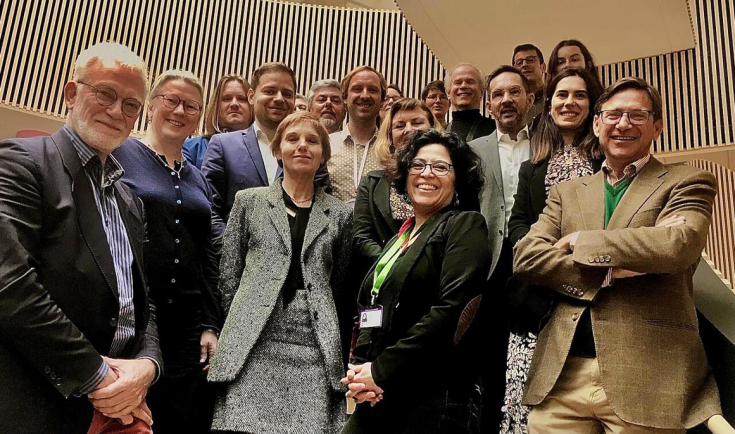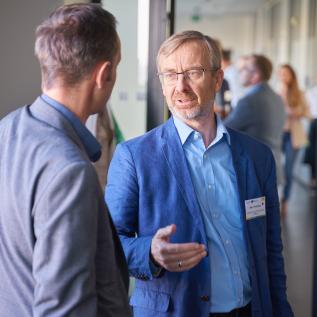Financing and incentivising energy renovation of condominiums

On 31 January – 1 February 2024, the Policy Learning Platform organised a peer review for the Métropole Européenne de Lille (MEL), France, which requested advice on ‘Financing and incentivising energy-efficient renovation of condominiums’.
MEL is already a frontrunner in providing support to households, but sought additional guidance on how to support co-owners who may not have funds available to initiate works, good practices on the overall funding of condominium renovation, and how to engage citizens and co-owners to participate in renovations.
Current state of affairs
Today, one in four private dwellings (135,000 homes) in MEL is in a condominium (8,500 buildings) – around a third of which were built before 1974, and three quarters are small (having fewer than 12 units). This co-owned building stock is often predominantly rented and concentrated in urban centres. To improve the energy performance of these condominiums, Lille has created the AMELIO Copro programme, which aims to support around sixty co-owners per year in their renovation projects, 15 buildings in the improvement of their management, and 400 co-owners and tenants per year for partial private works.
While funds are available from several national and local sources for covering part of the work, the aid is only paid once the project is completed, so there is a need for pre-financing. However, the AMELIO Copro programme is experiencing difficulties in offering co-ownerships enough pre-financing solutions for their works. Pre-financing solutions are not of sufficient scale, both in the amounts offered, and the condominiums covered, with specific challenges for ‘fragile co-ownerships’ – those with outstanding debts. Due to these cashflow problems, the number of renovation projects undertaken remains limited.
Peers from across Europe
Alongside Astrid Severin and Simon Hunkin, our Thematic Experts on ‘Greener Europe’, six excellent peers participated in the peer review:
- Alessandro Attolico, Province of Potenza, Italy
- Eduardo Brunet, Green Finance Institute, Spain
- Sébastien Descours, Energies Demain, SERAFIN/ORFEE, France
- Tommy Lindström, Energy Agency Southern Sweden
- Beatriz San Martín, Nasuvinsa Navarra, Spain
- Nicholas Stancioff, Funding for Future, Latvia
The highly experienced peers provided tailored policy recommendations, giving the host valuable insights, know-how, and practical suggestions for solving the challenges presented above.
Some recommendations
MEL is a frontrunner with a very good support system and collaboration with relevant local stakeholders in place. To implement the energy-efficient renovation of the majority of its 8,500 condominiums, the Metropole would need to achieve higher volumes and a faster pace of implementation. This would mean moving from the renovation of single buildings and pilot projects towards energy-efficient renovation of districts and types of buildings. The new approach should be part of a long-term, strategic approach with ambitious targets that demonstrates direction of travel. MEL could envisage to secure more funding to increase its own capacity i.e. bringing a dedicated financial expert into its housing department to steer through different financial options. These together can increase credibility and trust with financial institutions to tap into resources.
To meet the renovation challenge, a project pipeline with higher investment volumes should be developed. Project aggregation can help to achieve scale, i.e., filtering building characteristics, applying standard methodologies, developing guidelines, and renovating districts or groups of buildings of the same type. These larger scale initiatives are more attractive for investors, with a larger potential return on investment. Common, or joint, procurement efforts can also bring down costs for each building. A major hurdle in most regions remains the availability of skilled professionals – offer training of installers, construction companies, managers and auditors which could be addressed through specific training programmes.
Renovations can be pre-financed via multiple options including bank loans, which can be variable or long-term fixed loans of 20-25 years. Community funding can enable larger scale renovations, e.g. multiple buildings or full districts. Savings can also be collected via small payments from co-owners during the preparation phase and ELENA funding could be used for financing integrated home renovation services, and for providing technical assistance to citizens. Energy Performance Contracting (EPC) is well proven, with different business models such as Energy Service Agreements, Energy Guarantee Contracts, or Energy Savings Sharing.
Renovation is as much about people, as about buildings. Citizens need to be confident and comfortable in a process, which can disrupt their daily life. To facilitate this process, the participation of citizens should be encouraged and tailor-made information should be available i.e. through professional advisory services, acting as a one-stop-shop to guide through the entire process. Moreover, in addition to increasing the energy performance of renovated buildings, communications should also highlight health, security, comfort and quality of life improvements. Pilot projects and successful renovations should be used as showcases, and MEL should actively go to its communities to engage them with stalls and infodays.
More about these and other recommendations will be shared shortly in the follow-up report.
“The peer review is a very nice way of working together and brings us closer as Europeans. We obtained pragmatic and innovative financing proposals, and you provided operational recommendations on how to involve owners. This will save us a lot of time.”
“You have opened new doors for us to explore different financial models and provided a new way of looking at things. At the same time, we have seen that our local eco-system to support condominium owners is already quite well developed and how we can further build on it.”
“The peer review has been a firework of new ideas and interesting collaboration offers. A big thank you to all for helping us to think out of the box. We see that we need to change the scale, acquire internal financial expertise, adapt our strategy and look closer into guarantees and risk.”

Peer review publication
Find more information on the methodology and experiences of previous beneficiaries in our publication.

Apply for a peer review
Start your peer review application process today and find solutions to your policy challenge with our expert and peers!

